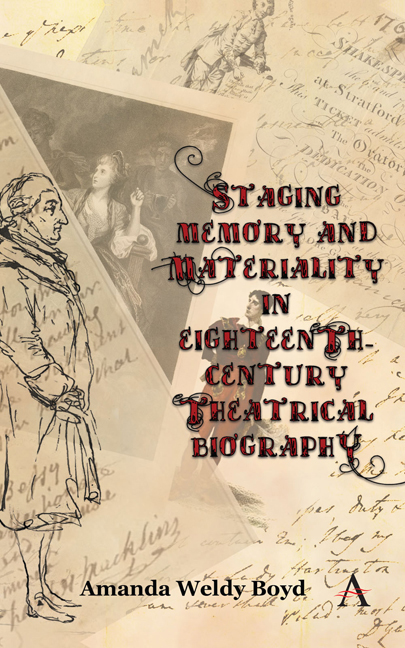Book contents
- Frontmatter
- Contents
- Acknowledgments
- Introduction: Competition and Legitimacy
- 1 “Davies's Name […] in Fame's Brightest Page Shall on Garrick Attend”: From Anonymous to Personalized Participation in the Memoirs of the Life of David Garrick
- 2 His Work, My Words: Anxiety and Competition in the Posthumous Lives of Charles Macklin, Comedian
- 3 Epistolary Resurrections: James Boaden and the Rise of the Professional Thespian Biographer
- Epilogue: The Limits of Materially Bound Permanence
- Notes
- References
- Index
Introduction: Competition and Legitimacy
Published online by Cambridge University Press: 10 May 2018
- Frontmatter
- Contents
- Acknowledgments
- Introduction: Competition and Legitimacy
- 1 “Davies's Name […] in Fame's Brightest Page Shall on Garrick Attend”: From Anonymous to Personalized Participation in the Memoirs of the Life of David Garrick
- 2 His Work, My Words: Anxiety and Competition in the Posthumous Lives of Charles Macklin, Comedian
- 3 Epistolary Resurrections: James Boaden and the Rise of the Professional Thespian Biographer
- Epilogue: The Limits of Materially Bound Permanence
- Notes
- References
- Index
Summary
Colley Cibber's Complaint as Generic Demand
In 1735, Charles Macklin, a comedian, put out another actor's eye with a cane in the green room at Drury Lane, claiming that the lesser actor had stolen his prop wig. The offending actor, Thomas Hallam, died shortly thereafter, much regretted by Macklin. Incredibly, Macklin recovered from this scandal and enjoyed a lengthy career delighting the British public. Possibly more incredible was the apocryphal claim that many potential witnesses were unable to supply testimony about the skirmish because they had been too engrossed in reading a draft of the riveting autobiography of a fellow actor, Colley Cibber. Thus, legend has it that Nero played the fiddle while Rome burned, and actors read Cibber's autobiography while Macklin lay in the center of the green room, weeping over the disfigured body of young Hallam.
Before the story goes much further, it seems important to include that the source of the above story was none other than Colley Cibber himself, who, along with his duties as actor, stage manager, playwright, and poet laureate, appeared to be his own best publicist. Yet the popularity of Cibber's An Apology for the Life of Colley Cibber (published in 1740) was— and is— undeniable, having outstripped all other accomplishments of a remarkably accomplished man. While small attempts at theatrical biography already existed, the above anecdote indicates the novelty of Cibber's book. Although it was technically an autobiography rather than a biography, Cibber's book was revolutionary within the nascent genre, particularly because Cibber spent so much of the Apology functioning as a biographer of other actors in order to fulfill his stated desire of providing, concurrently, a history of the stage from the Restoration through 1740. As the bellwether of this new genre, Cibber attempted to describe both the need for, and the limitations of, the biographical project as specifically applied to thespian subjects: “Pity it is, that the momentary beauties flowing from an harmonious elocution cannot, like those of poetry, be their own record; that the animated graces of the player can live no longer than the instant breath and motion that represent them; or, at the least, can but faintly glimmer through the memory and imperfect attestation of a few surviving spectators.”
- Type
- Chapter
- Information
- Publisher: Anthem PressPrint publication year: 2017



